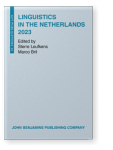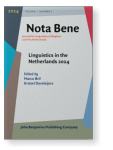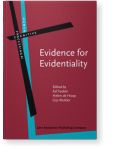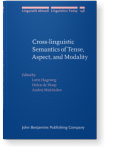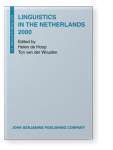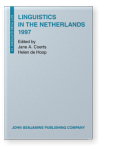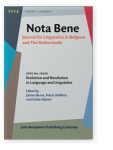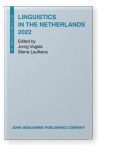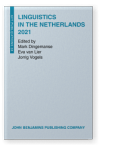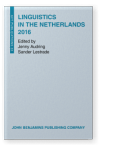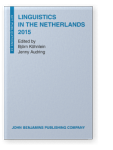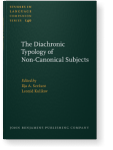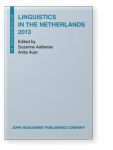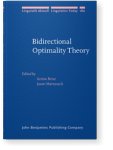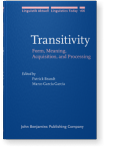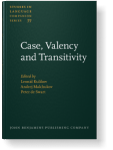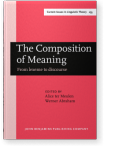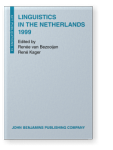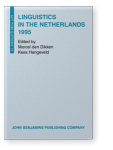Helen de Hoop
List of John Benjamins publications for which Helen de Hoop plays a role.
Yearbook
Journal
Evidence for Evidentiality
Edited by Ad Foolen, Helen de Hoop and Gijs Mulder
[Human Cognitive Processing, 61] 2018. vii, 313 pp.
Subjects Cognition and language | Cognitive linguistics | Discourse studies | Pragmatics | Semantics | Theoretical linguistics
Cross-linguistic Semantics of Tense, Aspect, and Modality
Edited by Lotte Hogeweg, Helen de Hoop and Andrej L. Malchukov
[Linguistik Aktuell/Linguistics Today, 148] 2009. vii, 406 pp.
Subjects Generative linguistics | Semantics | Theoretical linguistics | Typology
Linguistics in the Netherlands 2000
Edited by Helen de Hoop and Ton van der Wouden
[Linguistics in the Netherlands, 17] 2000. x, 246 pp.
Subjects Theoretical linguistics
Linguistics in the Netherlands 1997
Edited by Jane A. Coerts and Helen de Hoop
[Linguistics in the Netherlands, 14] 1997. x, 230 pp.
Subjects Theoretical linguistics
2024 Introducing Nota Bene Evolution and Revolution in Language and Linguistics, Berns, Janine, Marie Steffens and Esther Baiwir (eds.), pp. 1–2 | Editorial
2023 Past tense reference to future eventualities: A Reichenbachian approach Linguistics in the Netherlands 2023, Leufkens, Sterre and Marco Bril (eds.), pp. 55–68 | Article
The simple past in Dutch, as in many other European languages, is not necessarily used to refer to a past eventuality. A Dutch example of a verb in simple past that does not refer to a past event, taken from the Spoken Dutch Corpus (CGN), is: Pa die ging morgen golfen ‘Dad is going to play golf… read more
2023 On the acceptability of the not so dummy auxiliary ‘do’ in Dutch Linguistics in the Netherlands 2023, Leufkens, Sterre and Marco Bril (eds.), pp. 210–229 | Article
The auxiliary doen ‘do’ in standard Dutch is usually described as ‘dummy’ because it supposedly adds nothing substantial to the meaning of the sentence. We argue, however, that the auxiliary does have a function in the sentence, as a marker of either habitual or intentional aspect. In an online… read more
2023 Argument doubling with proper nouns in spoken Dutch: A corpus study Linguistics in the Netherlands 2023, Leufkens, Sterre and Marco Bril (eds.), pp. 248–262 | Article
Argument doubling, also known as (contrastive) left-dislocation, is common in spoken Dutch, but it is unclear exactly what triggers it. Earlier proposals in the literature showed that the construction is not used for marking contrast, and suggested it is used for marking shifted topics instead.… read more
2022 Claiming common ground with utterance-final particle hoor in Dutch: ‘Don’t tell anyone!’ claiming common ground with hoor Linguistics in the Netherlands 2022, Vogels, Jorrig and Sterre Leufkens (eds.), pp. 88–102 | Article
In this article we conduct a pragmatic analysis of the Dutch utterance-final particle hoor (lit. ‘hear’). Apparently, hoor has contradictory uses. It ex-presses politeness (involvement, togetherness), but it can also contribute to the face-threatening force of an utterance. We argue that there… read more
2022 The use of the Dutch discourse particle eigenlijk by native and non-native speakers Linguistics in the Netherlands 2022, Vogels, Jorrig and Sterre Leufkens (eds.), pp. 174–191 | Article
In this paper, we investigate whether non-native speakers of Dutch use the interpersonal discourse particle eigenlijk differently than native speakers of Dutch. Particles such as eigenlijk are considered to be very difficult to learn for non-native speakers. Eigenlijk might be even more… read more
2021 Strange nominative case in topicalized object pronominal relative clauses Linguistics in the Netherlands 2021, Dingemanse, Mark, Eva van Lier and Jorrig Vogels (eds.), pp. 81–97 | Article
In an online production experiment, we investigated the effect of sentence position on the preference for either a nominative or object form of an object pronoun restricted by a relative clause in Dutch. Results show a significant preference for the nominative form of the restricted object… read more
2018 Introduction: Evidentiality: How do you know? Evidence for Evidentiality, Foolen, Ad, Helen de Hoop and Gijs Mulder (eds.), pp. 1–16 | Introduction
2018 Chapter 3.
I think and I believe: Evidential expressions in Dutch Evidence for Evidentiality, Foolen, Ad, Helen de Hoop and Gijs Mulder (eds.), pp. 77–97 | Chapter
This chapter focuses on the evidential use of Dutch denken ‘think’ and geloven ‘believe’ with a first person pronoun. On the basis of Twitter data we conclude that some constructions containing these verbs show features of grammaticalization and that the evidentiality at stake can be labelled as… read more
2016 Imperatives and politeness in Dutch Linguistics in the Netherlands 2016, Audring, Jenny and Sander Lestrade (eds.), pp. 41–53 | Article
Imperatives are usually thought of as direct and therefore impolite. However, imperatives such as Have some coffee, Enjoy your holiday, or Sleep well are not considered impolite. The reason seems to be that these imperatives refer to actions that are beneficial to the hearer only. We make a… read more
2015 ‘A relieved Obama’ won’t last long Linguistics in the Netherlands 2015, Köhnlein, Björn and Jenny Audring (eds.), pp. 75–87 | Article
Indefinite articles are generally used to introduce new or unfamiliar entities to the discourse. However, in noun phrases such as een opgeluchte Obama ‘a relieved Obama’, the proper noun denotes a familiar individual who does not even have to be new in the discourse. Yet, an indefinite article is… read more
2013 The rise of animacy-based differential subject marking in Dutch The Diachronic Typology of Non-Canonical Subjects, Seržant, Ilja A. and Leonid Kulikov (eds.), pp. 35–54 | Article
There are different pronouns available to express third person plural subjects in Dutch which differ in several aspects. One of these pronouns, hun ‘them’, was originally an object form, and can thus be considered a quirky subject. Therefore, there is an alternation between two third person… read more
2013 The effect of prescriptivism on comparative markers in spoken Dutch Linguistics in the Netherlands 2013, Aalberse, Suzanne and Anita Auer (eds.), pp. 89–101 | Article
Dutch prescriptive grammar rules dictate that the complementizer dan ‘than’ should be used in comparative constructions of inequality. This has been an issue for grammarians from the sixteenth century onwards when als ‘as’ started to be used as an alternative form in this type of context. In order… read more
2011 On the interaction of tense, aspect and modality in Dutch Bidirectional Optimality Theory, Benz, Anton and Jason Mattausch (eds.), pp. 151–168 | Article
In this chapter the interplay between tense, aspect and modality in the interpretation of modal auxiliaries in three different past tenses in Dutch is studied. After discussing the semantic effects of these factors separately, it is shown that each factor exerts a different, conflicting force on… read more
2010 Children and transitivity: The subject-object asymmetry in a natural setting Transitivity: Form, Meaning, Acquisition, and Processing, Brandt, Patrick and Marco García García (eds.), pp. 143–160 | Article
Many experiments on several languages have shown that children tend to interpret indefinite objects nonreferentially, while they tend to interpret indefinite subjects referentially. This is in accordance with Comrie’s (1989) generalization that subjects of transitive clauses are usually highly… read more
2009 Conflicting constraints on the interpretation of modal auxiliaries Cross-linguistic Semantics of Tense, Aspect, and Modality, Hogeweg, Lotte, Helen de Hoop and Andrej L. Malchukov (eds.), pp. 303–316 | Article
The Dutch modal auxiliaries kunnen ‘can’ and moeten ‘must’ can be interpreted in different ways: ‘participant-internal, ‘participant-external’, and epistemic. For each of the verbs, we assume a basic, default interpretation: ‘participant-internal’ for kunnen, ‘participant-external’ for moeten. In… read more
2009 The semantics of tense, aspect and modality in the languages of the world Cross-linguistic Semantics of Tense, Aspect, and Modality, Hogeweg, Lotte, Helen de Hoop and Andrej L. Malchukov (eds.), pp. 1–12 | Article
2006 Incremental distinguishability of subject and object Case, Valency and Transitivity, Kulikov, Leonid, Andrej L. Malchukov and Peter de Swart (eds.), pp. 269–287 | Article
2004 The problem of unintelligibility The Composition of Meaning: From lexeme to discourse, Meulen, Alice G.B. ter and Werner Abraham (eds.), pp. 69–82 | Article
2000 Preface Linguistics in the Netherlands 2000, Hoop, Helen de and Ton van der Wouden (eds.), p. | Miscellaneous
1999 Optimal Case Assignment Linguistics in the Netherlands 1999, Bezooijen, Renée van and René Kager (eds.), pp. 97–109 | Article
1997 Preface Linguistics in the Netherlands 1997, Coerts, Jane A. and Helen de Hoop (eds.), p. | Miscellaneous
1995 Only a matter of context? Linguistics in the Netherlands 1995, Dikken, Marcel den and Kees Hengeveld (eds.), pp. 113–124 | Article
